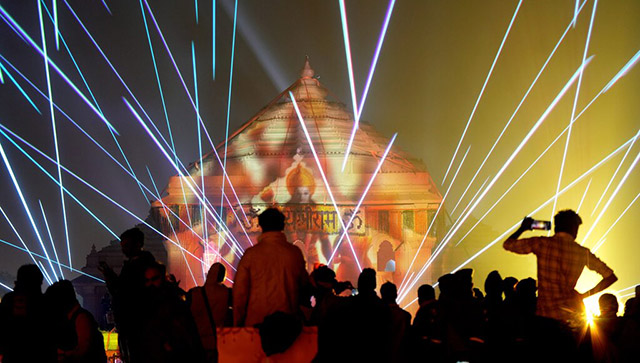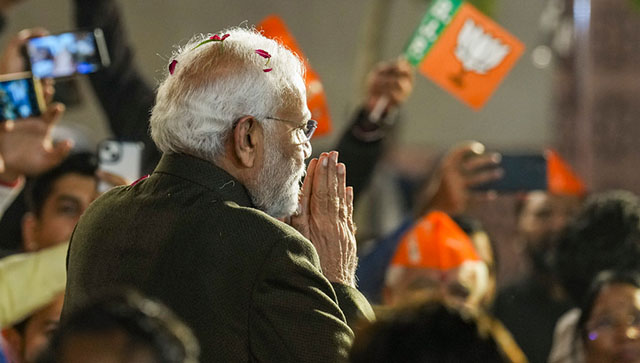At a recent conference in the capital, Romila Thapar, India’s most celebrated, and in certain quarters, most reviled, historian lamented that the country is rapidly, and inexorably, moving towards an ‘excluding’ nationalism. This, she furthered, is at lamentable variance with India’s nationalist struggle which was, in all essentials, anti-colonial in orientation and assimilative in character.
Thapar’s dirge comes in the wake of the news, uncovered first by a Reuters report , that the Ministry of Culture has constituted a committee of bureaucrats, archaeologists, and Sanskritists to write a ‘revisionist’ history of India against the “existing version” proliferating in schools and universities which, ideologues in this vein have held, is coloured by the corrupting influence of Marxism and anti-Hindu sentiment. The committee claims many objectives, but it is premised primarily on two – the pressing need to illustrate that present-day Hindus have descended directly from the earliest historical inhabitants of the subcontinent, and that their myths, literature, and traditions are not imaginations but fact, history, and the gospel truth.
Such an interpretation dismisses the messiness of history and identity as heresy and develops the case for the cultural and political ascendancy of the Hindu community and its emboldened majoritarianism. This, among other developments, as the report sensitively extrapolates, has led Muslim leaders and ideologues to fears of being treated as “second class citizens". Ever since the election of the Bharatiya Janata Party (BJP)-led government in 2014, Hindutva’s search for a glorious past has been unceasing and assiduous. This is a glorious past of apparitions and plastic surgeries that can be claimed only by the Hindu, and the present political purpose of this ancient claim is to develop an antiquity so far-drawn that other historical groups and communities, like the Muslims and the Christians, can be declared exogenous, alien, and undeserving of civilisational pride.
Yet, as Thapar illustrated in her impassioned address and the general body of her monumental work, identities are not spatially and chronologically frozen entities but fluid markers of historical processes of change – it was, in fact, not until the 19th century that ‘Hinduism’ as a syndicated religious system and the Hindus as its monolithic religious community came into being. The concern with antiquity is premised in the belief that what is older is more legitimate, but what is considered legitimate may not be old at all.
Of the political drive to prove the historicity of the Mahabharata and the Ramayana, Thapar asked why it is so important to confine literary traditions to the question of historical and archaeological existence. “Can we not,” Thapar quipped, “situate the Mahabharata and the Ramayana as ‘epic’ textual traditions in the spirit of their time and space reflecting social change and political processes?” The struggle to validate the historicity of the two Sanskrit epics is a ground much covered, and it is a struggle that has never yielded conclusive evidence.
Historians now accept the hypothesis proffered by VS Sukhthankar, who prepared the critical edition of the Mahabharata, that these are texts with a very loosely-composed sense of their time – they remember events from bygone centuries and locate themselves across a vast stretch of time; they are, therefore, texts conceived over centuries, even millennia, most probably from the fourth century BCE to the fourth to fifth centuries CE. In accepting this, historians have transcended their disciplinary fetish of historicity and attempted to unravel what the epics can tell the historian of their periods of composition. Thapar asked if “templates of ritual from the Harappan Civilisation could have continued” well after the civilisation’s demise, and if the Mahabharata could be seen as a text that negotiates between the immigrant Aryans and the natives. This would explain the many contradictions implicit in the text, showing kavya and itihasa as mutually reinforcing and ultimately indistinguishable in both capturing and reinventing history.
Speaking of nationalism in general and Hindu nationalism in particular, Thapar remarked that in its version of ‘excluding’ nationalism, Hindutva is redefining heritage. Heritage is not, after all, a cultural and historical aggregation that is unthinkingly and unquestionably passed from generation to generation but “something that every generation creates - the invention of heritage is a continuous, porous, fluid process.” Nationalism, particularly when religious, is not heritage itself, and yet it uses heritage all the time in myriad, and often insidious ways.
Thapar stressed that Hindutva’s conception of heritage reflects “elite productions and prerogatives” and that its supposed past is imagined, excluding, and dangerous for a democratic and secular polity. To Romila Thapar, there is a need to reclaim heritage from the hands of Hindutva by falsifying its flawed conceptions of history and identity, by furthering the idea of an assimilative heritage that belongs to everyone, and in being unstinting in one’s commitment to a secular society.
)
)
)
)
)